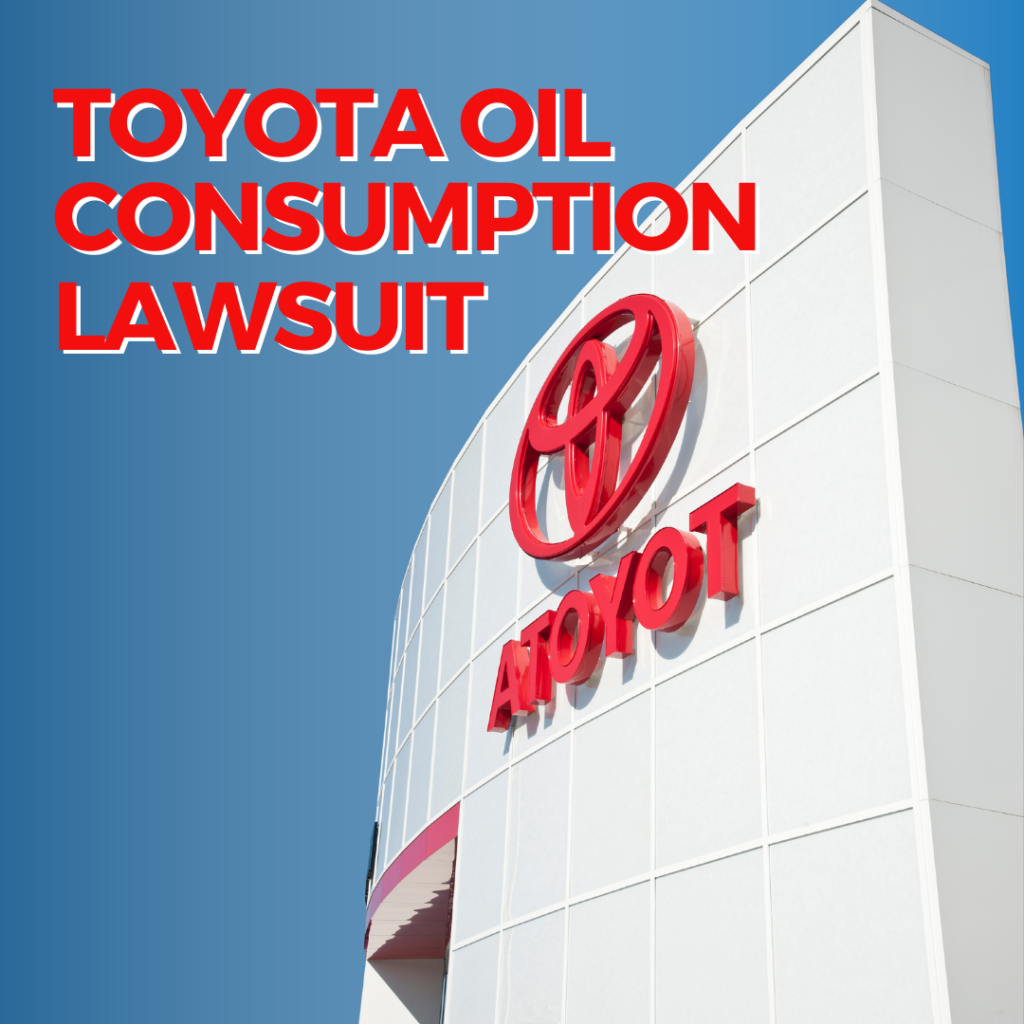Toyota Oil Burning Lawsuit In 2024
The defective engines of Toyota immediately put drivers along with passengers in danger. If you or your loved one has suffered damages or injuries from Toyota oil burning, filing a Toyota oil-burning lawsuit is a viable option to get compensated.
The lawsuits state that the plaintiffs’ vehicles exhausted their oil supply in 3,440 to 4,300 miles before an oil change would typically be performed at 5,000 miles under Toyota’s recommended maintenance schedule. Moreover, according to the Toyota oil class action lawsuits, the company refused to repair the vehicles under the warranty when the plaintiffs contacted Toyota. Toyota reasoned that the warranty had expired or did not cover the defect.
In addition, Toyota was made aware of the issues after receiving information from dealers and records from the National Highway Traffic Safety Administration. The complaints also alleged that the company knew the nature and extent of the problem from its internal record keeping and durability testing and warranty and post-warranty claims.
Types of Toyota vehicles having oil defects
Here is a list of Toyota vehicles that suffer from the oil consumption defect
- 2007-2009 Toyota Camry.
- 2007-2011 Toyota Camry Hybrid.
- 2007-2008 Toyota Solara.
- 2009 Toyota Corolla.
- 2009 Toyota Matrix.
- 2006-2008 Toyota RAV4.
- 2007-2008 Scion Tc.
- 2008-2009 Scion Xb.
When did the oil consumption issues arise?
According to a new lawsuit, the 2006-2008 model years have a nasty habit of chugging oil at a rate of 1-quart fluid level per 1,200 miles per gallon. However, Toyota’s recommendation to the public was a 1-quart fluid level per 5,000 miles for engine maintenance.
The issues started showing when the problems reportedly manifested themselves when owners took their vehicles in for scheduled maintenance, including having the oil changed, according to the Toyota class-action lawsuit for oil consumption. In addition, several of the plaintiffs have alleged that the amount of fluid in the oil dropped to nearly nothing over the course of the roughly 5,000 miles between expected maintenance. One plaintiff (the person who filed a complaint) even alleged that a local service center employee told her that it was abnormal for vehicles to consume oil at a rate that would deplete the entirety of her oil shorter than Toyota’s recommended maintenance intervals.
Most disturbingly, the oil consumption issues lead to no lubrication before a driver realizes it. Some noted that the engine was making a knocking noise which can be an indicator of impending failure. The most major component of design defect-based class action lawsuits is the impact of the failure on an owner’s safety as well as those of its occupants. The plaintiffs’ Toyota oil consumption attorney argues that because an engine failure can lead to serious accidents, it can also put people at risk.

Disclaimer: The information provided in this article is for general educational purposes only. Ethen Ostroff Law is no longer accepting new cases similar to the one discussed here in. The content is intended to provide general information about legal matters and is not a substitute for professional legal advice. Readers should seek the advice of qualified legal professionals for their specific situations.
Why do people experience Toyota oil consumption issues?
In August 2011, Toyota provided a technical service bulletin (TSB) about the defect. They stated that some 2006-2011 model year vehicles equipped with the 2AZ FE engine might exhibit engine oil consumption. The piston assembly was also changed to minimize oil consumption.
Therefore, for drivers of these vehicles, it means that the oil pressure light could come on early and often or that the engine can burn a quart of oil every 1,000-1,200 miles. Nevertheless, this oil consumption could bring long-term damage to the engine and even cause it to fail. It could also cost the car owner more because they will have to purchase more oil and take the car into the shop more often.
And yet, it was not until 2015 before Toyota offered to repair the issue for free, and even then, only for certain models and within a limited time window. However, this offer was too little, too late and left many Toyota owners out in the cold. After all, by 2015, most of the drivers had already shelled out several thousand dollars in repairs.
How to fix engine oil consumption
It has been advised that you can lessen the oil consumption by switching to a heavier viscosity motor oil. Changing your oil viscosity grade is also a good idea for the next time. You can also replace your current 5W-20 oil with a 5W-30 or 10E030 if your engine is using a 5W-20.

Class action lawsuit against Toyota In 2024
In a Toyota class action lawsuit, plaintiffs alleged that Toyota was aware of the defects in the design. However, they still manufactured and sold their vehicles without warning consumers about the defects and their consequences. Plaintiffs likewise alleged that the automaker failed to warn drivers that this defect would lessen the resale value of their Toyotas and, more importantly, create serious safety issues.
Generally, a Toyota oil-burning lawsuit would allege one or a combination of the following:
- Toyota breached the express warranty.
- Toyota breached the duty of good faith and fair dealing.
- Toyota committed common law fraud.
- Toyota violated California’s Song-Beverly Act.
- Toyota violated several state-specific business and consumer protections.
However, the amount depends on the extent of damage to the engine. For example, if the amount awarded is less than the repair cost of the affected vehicle, the defendant will be liable for the rest. If the amount awarded is higher than the repair cost of the engine, the defendant will have to make a good difference between the award and the repair cost of the engine.
Most car owners in Toyota class-action lawsuit for oil consumption claimed that the engines produced excess amounts of fuel when the car needed fuel at a relatively low rate. Then, they burned up completely when the car needed more fuel. As a result, the increase in oil consumption was harmful to the environment. Although it was not clear how such a large engine could affect the timing chain, it was suspected that the oil consumption was caused by the timing chain being unbalanced as the vehicle idled.
The cost of Toyota oil consumption
Car owners waste thousands of dollars and lose vehicle value as a result of Toyota’s misleading business tactics. But, if people had been made aware of the oil consumption fault, they would have been less inclined to buy the automobiles, or they would have paid far less for them.
In addition, the fault is expensive to remedy since it necessitates removing the engine from the car and disassembling it. It has been found that vehicle owners spent anywhere between $2,000 and $7,000 for the repair, and many are seeking compensation for that.
Worse, Toyota has neither issued a recall nor offered to repay consumers who paid to have fix the defects.
The carmaker did launch a Limited Service Campaign (LSC) in 2015, which featured free repair for specific cars. However, many drivers had already spent their own money on repairs by that time. These drivers are now filing claims and hiring Toyota oil consumption lawyers to get compensation for the repairs, the loss of car value, the exorbitant oil expenses, and any other damages resulting from the fault.
Reasons why your car has excessive oil consumption
Apart from car defects, other factors contribute to excessive oil consumption. They include:
- Low-quality oil.
- Piston rings that are worn.
- The engine has been in use for a long time.
- Style of driving.
- Gaskets are used to prevent leaks by sealing parts together.
- Changing oil intervals.
- Not having the oil regularly checked.


